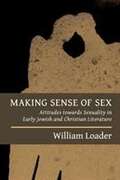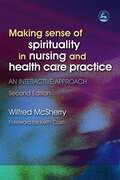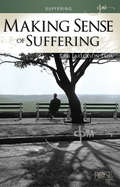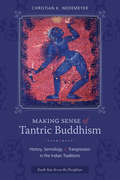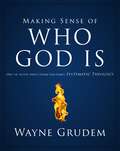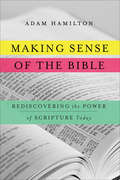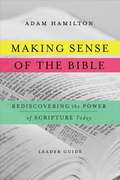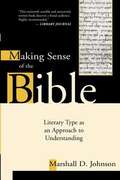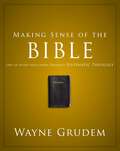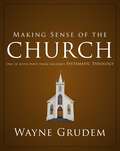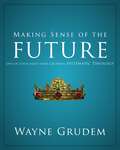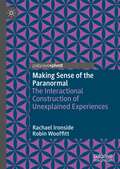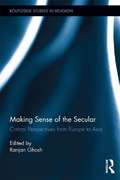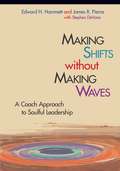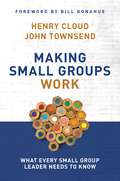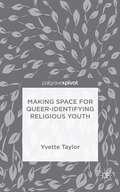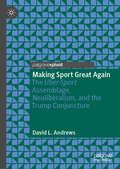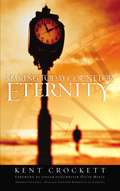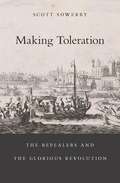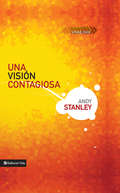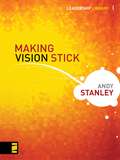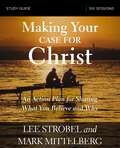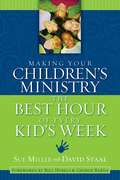- Table View
- List View
Making Sense of Sex: Attitudes Towards Sexuality in Early Jewish and Christian Literature
by William LoaderThis book is about listening to what writers were saying about sex in early Judaism and Christianity -- ancient words surprisingly relevant for today. It functions as both a summary and a conclusion to William Loader's five previous books on sexuality in a form accessible to those who may not have a background knowledge of early Judaism and Christianity. It also contains a useful subject index to those five previous volumes. <p><p> In examining thoroughly all the relevant writings and related evidence of the Greco-Roman period, Loader dialogues with scholarship related to each writing in order to make his conclusions as objective as possible. By enabling the reader to listen respectfully to these ancient texts, Making Sense of Sex provides a basis for informed discussion of sexual issues today.
Making Sense of Spirituality in Nursing and Health Care Practice: An Interactive Approach Second Edition
by Wilf Mcsherry'This is a well-written and useful book, particularly for those healthcare professionals who, with a little more confidence, and perhaps some Chaplaincy support, are well able to support their patients on their spiritual journeys. It would be an excellent tool for learning sessions between Chaplaincy and nursing staff, along with other relevant professional groups.' - Signpost 'This book considers why the spiritual needs of individuals are important. In an attempt to explain, the book uses case studies, which show the relationship of theory to practice. It is an interactive book encouraging reflection to explore the meaning of spirituality to patients and health care professionals. The exercises also attempt to explain the importance of a team approach to spiritual assessment as part of a holistic assessment. The book gives clear explanations of spirituality in the context of Holism and the different sections give plenty of food for thought. There are excellent references and suggestions for further reading. It is not a book for light reading but would be invaluable when encountering difficulties with a spiritual assessment or situation.' - Journal of Community Nursing Caring for the spiritual needs of patients is a highly significant yet often neglected and misunderstood aspect of health care. This results, in part, from a general lack of guidance and instruction given to healthcare professionals on the subject. This new edition of an established introductory guide to spirituality and health care practice draws extensively on case studies illustrating the application of theory to practice. It encourages the exploration, through reflective activities, of what spirituality means, both to patients and to the healthcare professionals caring for them. This book provides a comprehensive introduction to spiritual care for heath care professionals in all areas of practice.
Making Sense of Suffering
by Joni Eareckson TadaMaking Sense of Suffering by Joni Eareckson TadaSuffering is miserable. When you're overwhelmed by pain and problems, it's easy to feel helpless, hopeless and sinking into a whirlpool of self-pity.Joni Eareckson Tada knows about these emotions first hand. A diving accident in 1967 left her confined to a wheelchair as a quadriplegic at the age of 17. Joni knows what it's like to suffer chronic pain. Yet she has found comfort and meaning in the God of the Bible.Joni says, "Somewhere after the first five years of life in my wheelchair, I noticed a change in my hardships. I was beginning to see how my quadriplegia was working for my good and God's glory - simply put, it meant becoming more like Christ."Making Sense of Suffering is a Scripture-based ebook that will bring hope and comfort to those who are going through for personal difficulties, and will be a great help to groups dealing with grief, disabilities, emotional and physical trauma, divorce, and more.
Making Sense of Tantric Buddhism: History, Semiology, and Transgression in the Indian Traditions (South Asia Across the Disciplines)
by Christian WedemeyerMaking Sense of Tantric Buddhism fundamentally rethinks the nature of the transgressive theories and practices of the Buddhist Tantric traditions, challenging the notion that the Tantras were "marginal" or primitive and situating them instead—both ideologically and institutionally—within larger trends in mainstream Buddhist and Indian culture.Critically surveying prior scholarship, Wedemeyer exposes the fallacies of attributing Tantric transgression to either the passions of lusty monks, primitive tribal rites, or slavish imitation of Saiva traditions. Through comparative analysis of modern historical narratives—that depict Tantrism as a degenerate form of Buddhism, a primal religious undercurrent, or medieval ritualism—he likewise demonstrates these to be stock patterns in the European historical imagination.Through close analysis of primary sources, Wedemeyer reveals the lived world of Tantric Buddhism as largely continuous with the Indian religious mainstream and deploys contemporary methods of semiotic and structural analysis to make sense of its seemingly repellent and immoral injunctions. Innovative, semiological readings of the influential Guhyasamaja Tantra underscore the text's overriding concern with purity, pollution, and transcendent insight—issues shared by all Indic religions—and a large-scale, quantitative study of Tantric literature shows its radical antinomianism to be a highly managed ritual observance restricted to a sacerdotal elite. These insights into Tantric scripture and ritual clarify the continuities between South Asian Tantrism and broader currents in Indian religion, illustrating how thoroughly these "radical" communities were integrated into the intellectual, institutional, and social structures of South Asian Buddhism.
Making Sense of Who God Is: One of Seven Parts from Grudem's Systematic Theology (Making Sense of Series)
by Wayne A. GrudemWith clear writing—technical terms kept to a minimum—and a contemporary approach, emphasizing how each doctrine should be understood and applied by present-day Christians, Making Sense of Who God is explores the existence of God through inner knowledge and evidence found in Scripture and in nature. Topics include but are not limited to Traditional “Proofs” for God’s Existence: covering cosmological, teleological, ontological, and moral evidence of the Creator; The Trinity: the three distinct persons each equal to the whole being of God; Creation: including the assertion that, when all the facts are understood, there will be “no final conflicts” between Scripture and natural science; and God’s Providence: the Creator’s continued involvement with all created things and human actions that make a difference within God’s providence. Written in a friendly tone, appealing to the emotions and the spirit as well as the intellect, Making Sense of Who God is helps readers overcome wrong ideas, make better decisions on new questions, and grow as Christians.
Making Sense of the Bible
by Adam HamiltonIn Making Sense of the Bible, Adam Hamilton invites us into an honest conversation about the Bible. The book begins with foundational questions such as, How and when was the Bible written? Who decided which books made it into the scriptures and why? How literally must we read it? And, Is the Bible ever wrong?From there, Hamilton considers the real questions people frequently ask that continue to divide Christians and denominations alike, including:Were Adam and Eve real people? Why is God so violent in the Old Testament?Why would Paul command women to "keep silent in the church"? Is Jesus the only way to salvation?How does God view homosexual people?Is the Book of Revelation a guide to the End Times?In approachable and inviting language, Hamilton addresses these often misunderstood biblical themes leading readers to a deeper appreciation of the Bible so that we might hear God speak through it and find its words to be life-changing and life-giving. nd life-giving.
Making Sense of the Bible [Leader Guide]: Rediscovering the Power of Scripture Today (Making Sense of the Bible)
by Adam HamiltonIn this six week video study, Adam Hamilton explores the key points in his new book, Making Sense of the Bible. With the help of this Leader Guide, groups learn from Hamilton as his video presentations lead groups through the book, focusing on the most important questions we ask about the Bible, its origins and meaning.
Making Sense of the Bible: Literary Type as an Approach to Understanding
by Marshall D. JohnsonFocusing on the eight major literary forms in the Bible -- wisdom literature, liturgical materials, quasi-historical material, prophetic writings, collections of laws and precepts, apocalyptic literature, letters, and Gospels -- Johnson describes each form's central features and gives readers a sense of what to expect from each literary form and how to approach it.
Making Sense of the Bible: One of Seven Parts from Grudem's Systematic Theology (Making Sense of Series)
by Wayne A. GrudemWith a strong emphasis on the scriptural basis for each doctrine—what the whole Bible teaches us today about a particular topic; clear writing, with technical terms kept to a minimum; and a contemporary approach, emphasizing how each doctrine should be understood and applied by present-day Christians, Making Sense of the Bible is required reading for understanding the relevant passages of Scripture. Topics include Canon of Scripture: the list of all books that belong in the Bible; Authority of Scripture: all words in Scripture are God’s words because that is what the Bible claims for itself; Clarity of Scripture: the Bible is written so that its teachings are able to be understood by all who read it; Necessity of Scripture: the Bible is necessary for knowledge of the gospel; and Sufficiency of Scripture: Scripture contains all the words of God he intended his people to have. Written in a friendly tone, appealing to the emotions and the spirit as well as the intellect, Making Sense of the Bible helps readers overcome wrong ideas, make better decisions on new questions, and grow as Christians.
Making Sense of the Church: One of Seven Parts from Grudem's Systematic Theology (Making Sense of Series)
by Wayne A. GrudemWith clear writing and a contemporary approach, emphasizing how each doctrine should be understood and applied by present-day Christians, Making Sense of the Church explores the community of all true believers for all time—the church. Topics include but are not limited to the invisible church—the church as God sees it; the visible church—the church as Christians on earth see it; the purity of church—the degree of freedom from wrong doctrine and conduct; the primary purpose of the church—ministry to God, believers, and the world; the power of the church—its God-given authority to carry on spiritual warfare, proclaim the gospel, and exercise church discipline; and spiritual gifts—abilities empowered by the Holy Spirit and used in any ministry of the church. Written in a friendly tone, appealing to the emotions and the spirit as well as the intellect, Making Sense of the Church helps readers overcome wrong ideas, make better decisions on new questions, and grow as Christians.
Making Sense of the Future: One of Seven Parts from Grudem's Systematic Theology (Making Sense of Series)
by Wayne A. GrudemWith clear writing and a contemporary approach, emphasizing how each doctrine should be understood and applied by present-day Christians, Making Sense of the Future explores the fulfillment of Scripture—the bodily return of Christ. Topics include but are not limited to the primary views of the Millennium (thousand years): Amillennialism—the reign of Christ is now being fulfilled; Postamillennialism—Christ will return after the millennium; Premillennialism—Christ will come back after the millennium. Whichever view the reader subscribes to, the end result is clear: there will be a sudden, personal, visible, bodily return of Christ. Written in a friendly tone, appealing to the emotions and the spirit as well as the intellect, Making Sense of the Church helps readers overcome wrong ideas, make better decisions on new questions, and grow as Christians.
Making Sense of the Paranormal: The Interactional Construction of Unexplained Experiences
by Robin Wooffitt Rachael IronsideThis book is a study of how people collaboratively interpret events or experiences as having paranormal features, or as evidence of spiritual agency. The authors study recordings of paranormal research groups as they conduct real life investigations into allegedly haunted spaces and the analyses describe how, through their talk and embodied actions, participants collaboratively negotiate the paranormal status of the events they experience.By drawing on the study of the social organisation in everyday interaction, they show how paranormal interpretations may be proposed, contested and negotiated through conversational and embodied practices of the group. The book contributes to the sociology of anomalous experience, and explores its relevance to other social science topics such as dark tourism, participation in religious spaces and practices, and the attribution of agency. This book will therefore be of interest to academics and postgraduate researchers of language and social interaction; discourse and communication, cultural studies; social psychology, sociology of religious experience; parapsychology, communication and psychotherapy.
Making Sense of the Secular: Critical Perspectives from Europe to Asia (Routledge Studies in Religion #24)
by Ranjan GhoshThis book offers a wide range of critical perspectives on how secularism unfolds and has been made sense of across Europe and Asia. The book evaluates secularism as it exists today – its formations and discontents within contemporary discourses of power, terror, religion and cosmopolitanism – and the focus on these two continents gives critical attention to recent political and cultural developments where secularism and multiculturalism have impinged in deeply problematical ways, raising bristling ideological debates within the functioning of modern state bureaucracies. Examining issues as controversial as the state of Islam in Europe and China’s encounters with religion, secularism, and modernization provides incisive and broader perspectives on how we negotiate secularism within the contemporary threats of terrorism and other forms of fundamentalism and state-politics. However, amidst the discussions of various versions of secularism in different countries and cultural contexts, this book also raises several other issues relevant to the antitheocratic and theocratic alike, such as: Is secularism is merely a nonreligious establishment? Is secularism a kind of cultural war? How is it related to "terror"? The book at once makes sense of secularism across cultural, religious, and national borders and puts several relevant issues on the anvil for further investigations and understanding.
Making Shifts without Making Waves
by Edward H. Hammett James R. Pierce Stephen DevaneIn an age of storms created by fast-paced lives, an unpredictable economy, population diversity, family life, and church/denomination challenges, leaders and organizations are needing new skills and strategies to deal with these changes. Making Shifts without Making Waves addresses the fears and aimlessness many organizations and leaders face when dealing with transition and change.
Making Small Groups Work: What Every Small Group Leader Needs to Know
by Henry Cloud John TownsendLead small groups through astounding growth with principles from the best-selling books How People Grow and Boundaries. No matter what need brings a group of people together—from marriage enrichment to divorce recovery, from grief recovery to spiritual formation—members are part of a small group because they want to grow. This book by psychologists Henry Cloud and John Townsend provides small-group leaders with valuable guidance and information on how they can help their groups to grow spiritually, emotionally, and relationally. With insights from their best-selling book How People Grow, Cloud and Townsend show how God’s plan for growth is made up of three key elements: grace plus truth plus time. When groups embrace those elements, they find God’s grace and forgiveness and learn how to handle their imperfections without shame as they model God’s love and support to one another. In addition to describing what makes small groups work, Leading Small Groups That Help People Grow explains the roles and responsibilities of both leaders and group members. Employing tenets from the book How People Grow, this book equips leaders to understand the ins and outs of how to promote growth, and using principles from their best-selling book Boundaries, they show how to identify and find solutions for common problems such as boredom, noncompliance, passivity, aggression, narcissism, spiritualization, over-neediness, over-giving, and nonstop talking.
Making Space for Queer-Identifying Religious Youth
by Yvette TaylorMaking Space for Queer-Identifying Religious Youth charts young people's understanding of religion, investigating the experiences, choices and identities of queer - lesbian, gay, bisexual, transgender - youth involved in inclusive churches. Rather than assume that sexuality and religion, and in this case Christianity, are separate and divergent paths, this book explores how they might mutually and complexly construct one another in times of religious-sexual citizenship. Taylor presents a methodological discussion on the 'public sociology' of religion and sexuality studies, and provides an illustrative focus on substantive fields often separated in disciplinary dis-orientations. These examples illustrate how participation shapes identifications; how marginalization and discrimination are managed; and how religion and sexuality serve as vehicles for various forms of belonging, identification and expression. 'Religion' and 'sexuality' are mutually constructed through gendered spaces, online spaces, and sensory spaces.
Making Sport Great Again: The Uber-Sport Assemblage, Neoliberalism, and the Trump Conjuncture
by David L. AndrewsBlending critical theory, conjunctural cultural studies, and assemblage theory, Making Sport Great Again introduces and develops the concept of uber-sport: the sporting expression of late capitalism’s conjoined corporatizing, commercializing, spectacularizing, and celebritizing forces. On different scales and in varying spaces, the uber-sport assemblage is revealed both to surreptitiously reinscribe the neoliberal preoccupation with consumption and to nurture the individualized consumer subject. Andrews further probes how uber-sport normalizes the ideological orientations and associate affective investments of the Trump assemblage’s authoritarian populism. Even as it articulates the regressive politicization of sport, Making Sport Great Again serves also as a call to action: how might progressives rearticulate uber-sport in emancipatory and actualizing political formations?
Making Today Count for Eternity
by Kent CrockettIn an age when more and more people are concluding that life is pointless, Pastor Kent Crockett proclaims that -- in fact -- how we live our lives today is critically important for all time. Making Today Count for Eternity shows readers that choices we make every day on earth will affect what we'll be doing for all eternity. First, says Crockett, we're here to learn the basics of eternity -- through study of the Scriptures and fellowship with God and His people. Ultimately, God will examine our post-salvation labors to determine our eternal rank and rewards. Readers will never be the same once they see how -- by changing our lives now -- we can alter our assignments in heaven forever. Fresh, insightful, biblical!From the Trade Paperback edition.
Making Toleration: The Repealers and the Glorious Revolution
by Scott SowerbyIn the reign of James II, minority groups from across the religious spectrum, led by the Quaker William Penn, rallied together under the Catholic King James in an effort to bring religious toleration to England. Known as repealers, these reformers aimed to convince Parliament to repeal laws that penalized worshippers who failed to conform to the doctrines of the Church of England. Although the movement was destroyed by the Glorious Revolution, it profoundly influenced the post-revolutionary settlement, helping to develop the ideals of tolerance that would define the European Enlightenment. Based on a rich array of newly discovered archival sources, Scott Sowerby’s groundbreaking history rescues the repealers from undeserved obscurity, telling the forgotten story of men and women who stood up for their beliefs at a formative moment in British history. By restoring the repealer movement to its rightful prominence, Making Toleration also overturns traditional interpretations of King James II’s reign and the origins of the Glorious Revolution. Though often depicted as a despot who sought to impose his own Catholic faith on a Protestant people, James is revealed as a man ahead of his time, a king who pressed for religious toleration at the expense of his throne. The Glorious Revolution, Sowerby finds, was not primarily a crisis provoked by political repression. It was, in fact, a conservative counter-revolution against the movement for enlightened reform that James himself encouraged and sustained.
Making Vision Stick
by Andy StanleyA vision. You as a leader may have it, but has your organization caught it? If a leader's vision is all about what could be and what should be, why are you buried under what is?
Making Vision Stick (Leadership Library)
by Andy StanleyThere are lots of books about discovering or developing a vision for your organization, but this one is about making that vision endure the corrosion of time and complexity--how to make your vision stick.Influential author and pastor Andy Stanley reveals the reasons why leaders' visions often falter, and he delivers 5 in-depth strategies so that you can dodge the pitfalls:How to state your vision simply.How to cast your vision convincingly.How to repeat your vision regularly.How to celebrate your vision systematically.How to embrace your vision personally.Many of us have good ideas, even great ones. The difficult part is putting them into practice and keeping that vision clear and visible to your organization--whether that's a business or a church--when there are so many things in the day-to-day living of that vision that can distract from it.Making Vision Stick offers valuable, practical tips and case studies. This is a book you'll want to highlight and dog-ear and pass around as you learn how to propel your organization toward the vision God has granted you.Vision is about what could be and should be, but life is about right this minute. The test of a true leader is in keeping that vision on track, day in and day out.
Making Wise the Simple: The Torah in Christian Faith and Practice
by Johanna W. H. van Wijk-BosThis book points out how God's care for and engagement with the whole world in the Torah set the tone for the entire biblical story. <p><p> The book pays special attention to how our treatment of strangers lies at the heart of the Torah's teaching. Without attempting a purely Jewish reading of the Torah, the author reclaims the Torah as a vibrant word for the Christian community in covenant with God. <p><p> Written in a personal style conversant with current scholarship but sprinkled with anecdotes, this book is for everyone who has a hunger and enthusiasm for what the biblical text may convey, the courage to ask disturbing questions of the text, and an openness to old words that may bring forth new things, perhaps even making one wise.
Making Wise the Simple: The Torah in Christian Faith and Practice
by Johanna W. van Wijk-BosToo long restricted to children's storybooks and cinematic extravaganzas, the Torah -- comprising the first five books of the Bible -- is an underappreciated mother lode of divine instruction, vitally important for Christians and the church. Convinced that both those who take the Torah too literally and those who neglect it are guilty of a naïve simplicity, Johanna van Wijk-Bos presents guidelines to help ordinary Christians recover this treasure in their faith and practice. Having lived in the Netherlands during the Nazi occupation, van Wijk-Bos recognizes that after the attempted annihilation of the Jews from Christian Europe, it cannot be business as usual for Christianity. In light of the Holocaust, Christians must commit themselves to the restoration of just relations between Christians and Jews. This commitment to address all that fractures human relations undergirds van Wijk-Bos's call for Christians to reengage the Torah.Making Wise the Simple points out how God's care for and engagement with the whole world in the Torah set the tone for the entire biblical story. The book pays special attention to how our treatment of strangers lies at the heart of the Torah's teaching. Without attempting a purely Jewish reading of the Torah, van Wijk-Bos reclaims the Torah as a vibrant word for the Christian community in covenant with God. Written in a personal style conversant with current scholarship but sprinkled with anecdotes, this book is for everyone who has a hunger and enthusiasm for what the biblical text may convey, the courage to ask disturbing questions of the text, and an openness to old words that may bring forth new things, perhaps even making one wise.
Making Your Case for Christ Bible Study Guide: An Action Plan for Sharing What you Believe and Why
by Lee Strobel Mark MittelbergIn his bestselling book The Case for Christ, Lee Strobel retraced his spiritual journey from atheism to faith by showing how the evidence he obtained from experts in the field of history, archaeology, and ancient manuscripts led him to the verdict that Jesus truly was the Son of God.Now, in this six-week training course, Lee and coauthor Mark Mittelberg will equip you with practical tools to equip you articulate this same message to your unsaved friends and present evidence that backs up Jesus' claims and credentials.As you go through the course, you will discover how to:Help your unsaved friends and family members open up to consider the case for ChristDescribe your own personal journey with Christ and how it has impacted youShare with confidence about the biblical record of Christ—that Jesus was realPresent the evidence for the resurrection of Christ—that Jesus died and was raised to lifeExplain the central message of Christ in an authentic and compelling wayHelp your unsaved friends and family members respond to the truth of JesusSessions include:Helping Friends Consider the Case for ChristDescribing Your Own Journey with ChristBacking Up the Biblical Record of ChristPresenting Evidence for the Resurrection of ChristExplaining the Central Message of ChristEncouraging Friends to Follow ChristDesigned for use with Making Your Case for Christ Video Study (9780310095156), sold separately.
Making Your Children's Ministry The Best Hour Of Every Kid's Week
by Sue Miller David StaalPromiseland is Willow Creek's highly successful children's ministry. Using examples from Promiseland and churches of all sizes around the country, this book provides stepbystep guidance and creative application exercises to help churches develop a thriving children's ministry-one that strives to be the best hour of every kid's week. Included are Scripturebased principles and practical resources for church staff members and volunteers who agree with the critical role children's ministry plays in a local church. Making Your Children's Ministry the Best Hour of Every Kid's Week, based on twentyeight years of experience at Willow Creek, explains four ministry foundations: Mission, Vision, Values, and Strategy. Content includes: Detailed answers to questions facing every children's ministry: - What does Jesus expect from children's ministry? - How can we evangelize lost kids and disciple saved kids at the same time, and should we? - How do we engage kids so they don't become bored? - How do we get better at recruiting and leading volunteers? - How can our ministry be a safe place for children? - Six specific ministry values that address the needs of today's children - Practical first steps for ministries that want to get serious about change - Clear indicators of success in children's ministry
